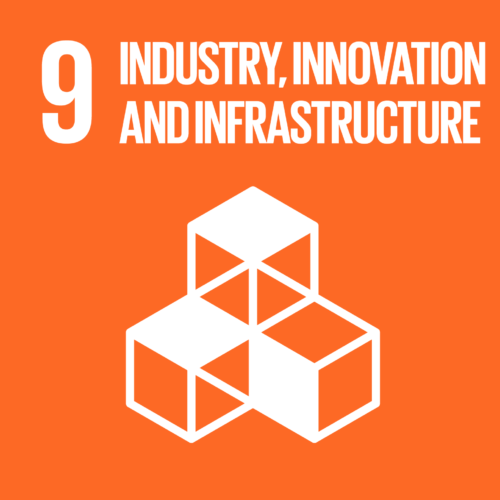 Waste Liquid Incineration System: Submerged Combustion System
Waste Liquid Incineration System: Submerged Combustion System
for Treating Waste
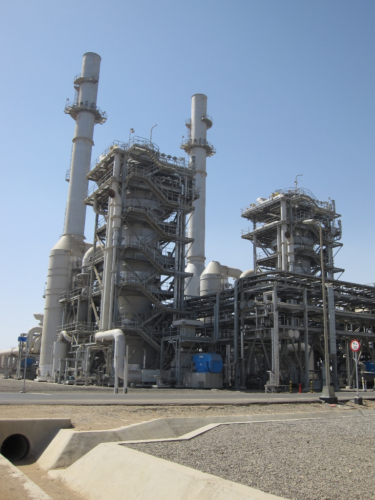
T
sukishima Kankyo Engineering’s Waste Liquid Incineration System, also known as Submerged Combustion System treats various liquid forms of waste through incineration. These waste by-products can be discharged from a wide spectrum of production processes pertaining to petrochemical, fine chemical, pharmaceutical, agrochemical, pulp and other industries. The technology can treat these liquid waste without secondary pollution, which is excellent for the environment.
There are many far-reaching and convenient applications of this system. Application includes: Freon destruction method for highly efficient destruction of fluoride-containing waste liquid, waste gas such as CFC or HCFC, and fluorocarbons such as HFC, PFC, SF₆, and NF₃.
Major Features and Advantages
I. Decomposes waste completely
Waste Liquid Incineration System can completely decompose the organic substances in the liquid waste despite the kind or character of the liquid waste.
II. Adaptation of Refractory
A refractory can be adapted according to the specification of the waste liquid, backed by 400 proven experiences.
III. Decreased Operating Costs
In an auxiliary furnace, running costs can be decreased. Because instead of fuel, the ignition of waste water with a lower heating value of 16 MJ / kg is possible with an auxiliary furnace.
IV. Electricity Generation
Heat Recovery is high, as waste heat from the quencher can generate electricity with a max of .300 kW electric power.
V. Discharged Salts are Dissolvable
Incinerator is vertical type, which allows the salts contained in the waste liquid to flow down in the incinerator as they are discharged smoothly and easily upon exit. The discharged salts can then be dissolved in water, making for easier discharge from the system.
VI. Acid Recovery
Hydrochloric acid can be recovered at higher than 30 percent concentration. In Fluorocarbon destruction system, hydrofluoric acid and/or fluorite can be recovered.
Tsukishima Kankyo Engineering exports the main equipment and instruments to plants in which this technology is installed. Local vendors will make non-pressurized vessels and towers, and will also construct and maintain the total incineration system, keeping labor costs local and low.
Technology Data
Conceivable applications
Waste Liquid Incineration System is for treating various liquid wastes discharged from various production processes of petrochemical, fine chemical, pharmaceutical, agrochemical, pulp and other industries without secondary pollution.
There are many possible applications for this system. These applications include Freon recovery/destruction method for highly efficient destruction of fluoride-containing waste liquid, exhaust gas by-products such as CFC and HCFC, and various fluorocarbons such as HFC, PFC, SF₆, and NF₃.

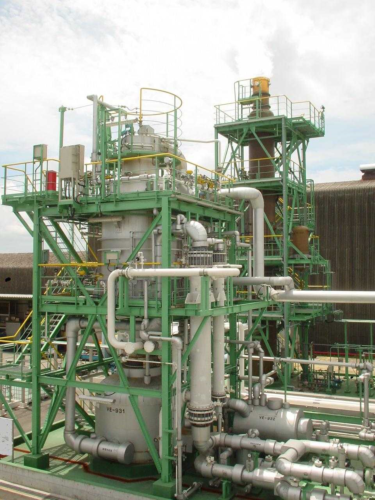
Competitive advantage
A) Non Trouble by salts
Incinerators are vertical type. Salts contained in waste liquid flow down in the incinerator and are discharged upon exit of the incinerator easily.
The discharged salts are dissolved in water, and are discharged from this system.
B) Regulation
The regulation values of exhaust gas and effluent can be cleared in all countries.
C) Refractory
A refractory which is adapted for the property of the waste liquid can be selected, because of approx.400 experiences.
D) Auxiliary Furnace
Running costs can be decreased, because instead of fuel, waste water with a lower heating value of 16 MJ / kg can be ignited in an auxiliary furnace.
E) Heat Recovery
Waste heat from quencher can generate electricity. Electric Power: max.300 kW
F) Acid Recover
– Hydrochloric acid can be recovered at higher than 30% concentration.
– Fluorite can be recovered.
G) Technical Support
Experienced engineers will present proposals concerning economic maintenance, capacity and performance enhancement plans, and energy-saving plans by using their advanced technical know-how and implementation skills.
H) Test Plant
Test plant can confirm the combustion condition of waste liquid. Flow Rate: max. 2 Liters / hr.
Performance
In our line-up of this system, the waste liquid incineration capacity ranges from 100kg/h to 20,000kg/h. Waste liquid including Sodium and Potassium can be combusted without early damage of refractory.
Several different types of fuel can be used for the auxiliary burner, not only gaseous and/or liquid fuels but also waste oil.
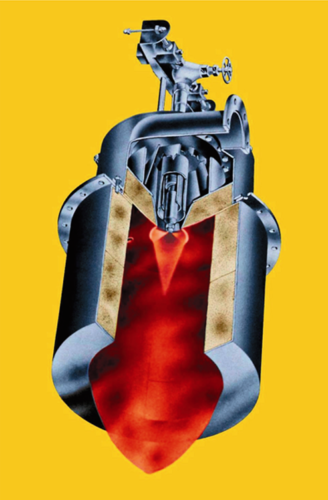
This system can reduce to less than 100ppm of NOx by non-catalysis reaction. Discharge SOx and hydrogen chloride (HCL) is restrained by neutralization in incinerator or quencher with caustic soda.
Total organic carbon (TOC) is converted into carbon dioxide (CO2) at a removal rate of 99.99% or greater. Fluorocarbon can be decomposed at a rate of 99.99% or greater. Dioxins concentration from stack is less than 0.1μg-TEQ / m3N, and it in effluent is less than 10pg-TEQ / Liter.
Note) Dioxins concentration
These values have been adopted as regulations in many countries for more than 10 years.
Technical maturity
Supply records of Waste Liquid Incineration System are approx. 400 from 1963. (See attached supply records)

Conceivable risk
A) Refractory Drop
Prevention) Thickness of refractory checking every year
Disposition) System Stop and installation of new refractory
B) Plugging of injection nozzle
Prevention) Checking of fluid pressure twice per one operation term
Disposition) Removing the plugged material after taking apart injection nozzle
Information on patent related to this technology (if applicable)
None. But, we have know-how which can be used to obtain a patent in the future.
Company Data
| Name | Tsukishima Kankyo Engineering Ltd. | ||||||||
| Address | 3-12-1, Harumi, Chuo-ku, Tokyo, 103-0053 Japan | ||||||||
| Capital | JPY 455 million | ||||||||
| Contact person | Department: Marketing and Sales Department Name: Mr. Hidefumi TOYOTAKE Tel.: +81-3-6758-2312 Fax: +81-3-6758-2324 E-mail: toyotake@tske.co.jp URL: www.tske.co.jp |
||||||||
| Number of employees | 170 including 20 for international operation (as of June 2018) | ||||||||
| Date of company foundation | April, 1958 | ||||||||
| Overseas offices |
|
Modality of business transaction
Partnership
We will export main equipment and instruments. Non-pressurized vessels and towers will be made by local vendor. Local vendor will construct and maintain our incineration system.
Export of product
We will export main equipment and instruments. Non-pressurized vessels and towers will be made by local vendor. Local vendor will construct and maintain our incineration system.
Attachments
Schematic illustration of the technology
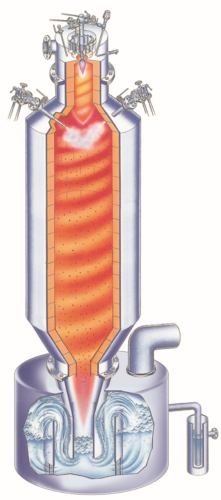
<Illustration:Waste Liquid Incineration System>
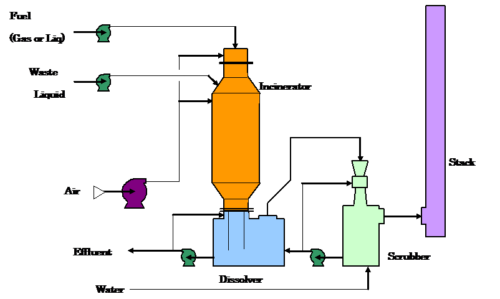
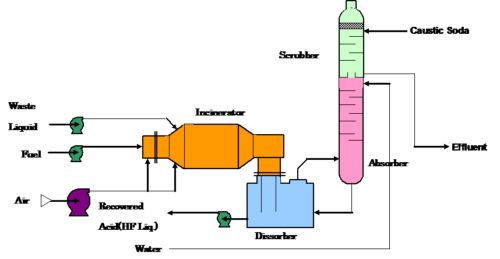
Contact Person(s)
*Please mention that you saw UNIDO's website when making the first contact with the company.
Registered Category
- Environmental Technologies : Waste treatment and management

